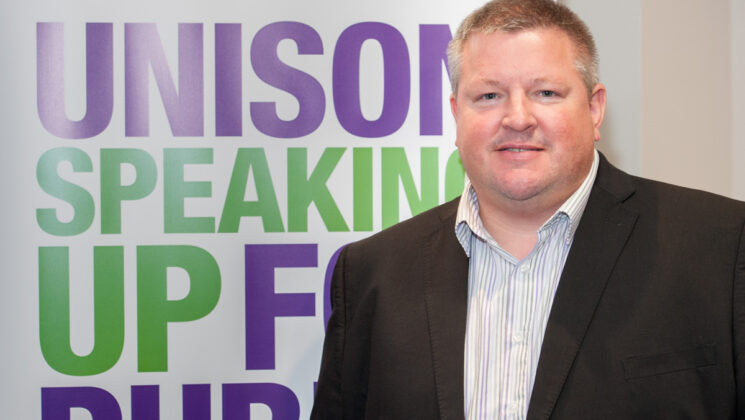UNISON’s head of local government Darron Dupre
Councils across Wales face a collective funding gap of over £200m in the next financial year forcing them to cut essential services, says a report published today (Thursday) by UNISON.
Waste collections, leisure centres, nurseries and other vital services will all be hit according to the findings based on information* from local authorities in Wales.
The UNISON report shows that Cardiff Council is set to have the largest funding gap of all the authorities in Wales at £44.9m. The next worst affected authority in Wales is Pembrokeshire County Council (£20.3m), then Rhondda Cynon Taf (£17.1m).
The record shortfall, totalling £201.6m across the 22 councils in Wales in 2023/24, means local authorities will be forced to rely on dwindling reserves, and cut services and jobs, says UNISON.
The report shows there is worse to come with the cumulative funding gap rising even further in 2024/25 to over £327.5m, says UNISON.
UNISON says skyrocketing inflation, energy costs and the economic impact of the mini budget mean that the actual shortfall will be many times higher.
The picture is likely to get bleaker still, says UNISON. Chancellor Jeremy Hunt has spoken of further cuts to the public sector, which are likely to compound the crisis in local government funding.
And as the cost-of-living crisis deepens and inflation soars, even greater strain will be placed on councils as their costs increase and demand grows for food banks and other support.
UNISON’s research is based on data relating to 22 local councils across Wales. It found that 21 of these have predicted budget gaps (with one authority still to publish data).
UNISON says even more services – as well as jobs – will be at risk if councils have to declare themselves effectively bankrupt.
UNISON Cymru Wales head of local government Darron Dupre said: “Local authorities provide the essential services everyone relies on such as waste collection, road repairs, and children’s care.
“But cash-strapped councils are having to resort to ever more desperate measures after years of austerity just to keep services going. Now the UK government looks set to make their predicament infinitely worse with emergency cuts to spending following the mini-budget fiasco.
“Council funding is a devolved issue, but the Welsh government remains heavily dependent on funding from Westminster. The Welsh government has done its best to limit financial challenges faced by councils, particularly during the pandemic, but additional money is needed in the longer term.
“Local communities across Wales cannot be the ones to pay the price for the government’s grotesque mismanagement of the economy. The new prime minister and chancellor must sort the crisis in local government funding and give councils the cash they need to save services.”
Notes to editors:
| Council | Funding Gap 2023/24 |
| Cardiff (Caerdydd) | £44,900,000 |
| Pembrokeshire (Sir Benfro) | £20,300,000 |
| Rhondda Cynon Taf | £17,156,000 |
| Isle of Anglesey (Ynys Môn) | £17,000,000 |
| Flintshire (Sir y Fflint) | £15,296,000 |
| Swansea (Abertawe) | £11,541,000 |
| Vale of Glamorgan (Bro Morgannwg) | £8,509,000 |
| Carmarthenshire (Sir Gaerfyrddin) | £8,000,000 |
| Bridgend (Pen-y-bont ar Ogwr) | £6,978,000 |
| Ceredigion | £6,800,000 |
| Conwy | £6,600,000 |
| Caerphilly (Caerffili) | £5,682,000 |
| Gwynedd | £5,500,000 |
| Merthyr Tydfil (Merthyr Tudful) | £5,500,000 |
| Torfaen | £5,436,000 |
| Monmouthshire (Sir Fynwy) | £5,400,000 |
| Powys | £3,163,000 |
| Blaenau Gwent | £2,544,000 |
| Newport (Casnewydd) | £1,957,000 |
| Wrexham (Wrecsam) | £1,945,000 |
| Denbighshire (Sir Ddinbych) | £1,400,000 |
| Neath Port Talbot (Castell-nedd Port Talbot) | Not yet published |
| Total Wales Funding Gap 2023/24: | £201,607,000 |
– *UNISON sent a Freedom of Information request to all 397 local councils in England, Scotland and Wales for their 2022/23 funding shortfall figure. A total of 251 responded, including four who provided no data. For the 46 who did not respond, UNISON obtained figures for 44 from each council’s medium-term financial strategy report. A full breakdown of UNISON’s findings is available.
– UNISON is the UK’s largest union with more than 1.3 million members providing public services in education, local government, the NHS, police service and energy. They are employed in the public, voluntary and private sectors.
Media contact:
Alastair Gittins, UNISON Cymru Wales 07816 53 83 97



